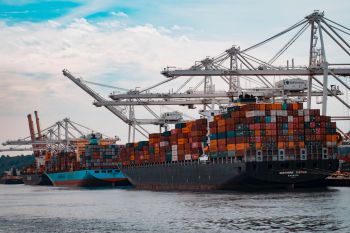News article
Why the Government should be using post-Brexit trade policy to deliver on the promise of net zero
By: Neil Vowles
Last updated: Wednesday, 9 September 2020

The Government’s current approach to negotiating post-Brexit trade deals is setting the UK up to fail its net zero targets, new analysis from trade law experts at the University of Sussex warns.
The Government needs to be showing far greater ambition and commitment to achieving net zero through its trade policy than is currently evident in its international negotiations, warn Dr Emily Lydgate and Chloe Anthony in analysis published by the UK Trade Policy Observatory (UKTPO).
By simply rolling over existing trade agreements, the UK is missing a significant opportunity to renegotiate trade deals along the lines of its net zero commitments, the UKTPO analysis explains.
The Government needs to develop a more interventionist trade policy to urgently deliver on net zero targets in key areas but risks falling foul of WTO regulations which could result in legal challenges unless it develops a clear and transparent approach to domestic subsidies, experts warn.
Dr Emily Lydgate, Senior Lecturer in Environmental Law at the University of Sussex and UKTPO member, said: “To meet its net-zero target, the UK needs to encourage trade and investment in low-carbon goods, services and technologies, and discourage trade and investment in high-carbon goods, services and technologies. Current UK green subsidies are likely to be WTO-compliant but fall short of the ambition needed to achieve the net-zero target, while upping ambition increases the risk of WTO non-compliance. There is a very delicate balancing act to be performed here and the UK Government’s lack of clear strategy on subsidies increases the likelihood of disputes.”
Chloe Anthony, doctoral researcher at the University of Sussex, said: “Our analysis has highlighted a worrying lack of cross-cutting strategy in UK trade and climate governance. At present, current UK climate mitigation lacks ambition and there is a lack of transparency around future measures. As a starting point to leverage trade policy in support of climate policy, the UK Government urgently needs to reform its approach to fossil fuel subsidies and go further in lowering trade barriers for environmental goods.”
Trade policy will be key to delivering urgent action in the pursuit of net-zero such as the phase-out of petrol and diesel vehicles, the installation of low-carbon heating, and the decarbonisation of industry, the experts warn.
But measures needed to implement these significant changes, such as restricting higher-emission imports, banning the import of certain products, imposing UK energy efficiency requirements on imports, or taxing imported products, would all potentially be subject to WTO notification and challenge.
The UKTPO analysis recommends the Government commit to ensuring that any FTA or continuity agreements they sign must contain reference to upholding the UK’s net-zero target. It also suggests setting a minimum compliance with the Paris Agreement to ensure new FTAs do not undermine the UK’s domestic carbon reduction target as a negotiating red line for the Government.
By phasing out its multi-billion pound fossil fuel subsidies, and being more transparent about the subsidies that remain, and limiting exceptions to carbon taxes, the UK Government could avoid the risk of falling foul of WTO rules on subsidies and take significant steps towards achieving its’ ambitious net-zero target.
The analysis also recommends that the Government take the opportunity to reduce the relatively high EU tariffs on bicycles and hybrid electric vehicles in a bid to make them more affordable to a broader spectrum of UK consumers.
The experts support the Committee on Climate Change's recommendation that the UK Government factor in aviation and shipping to its trade-related emissions if they want to meaningfully address the country’s carbon footprint.
And the UK Government cannot afford actions like its offer of £100 million bailout for airline FlyBe at the beginning of this year or risk WTO challenge and compromising its' own net zero commitments, the academics warn.
Dr Lydgate said: “The current emphasis by the UK Government in their pursuit of FTAs has been on expediency, to ensure that companies will not face new trade barriers after the transition period, and so they have copied and pasted EU language on trade and environment that is in some cases years out of step. This is a missed opportunity to reinforce action towards net-zero targets when FTAs have the potential to remove trade barriers on energy-efficient goods and services, align commitments to green subsidies and reduce fossil fuel subsidies, as well as coordinate carbon pricing mechanisms.”
Ms Anthony said: “The current UK approach to post-Brexit FTAs is a missed opportunity to realign our trade policy along low carbon principles. The most recent strategy document from the Department for International Trade makes no mention of climate change at all. The need for increased ambition is self-evident especially when you consider the UK is not even on track for its previous 80% emissions reduction target.”
An academic paper expanding on this analysis will be published in the Environmental Law Review (DOI: 10.1177/14614529209603) later this month.